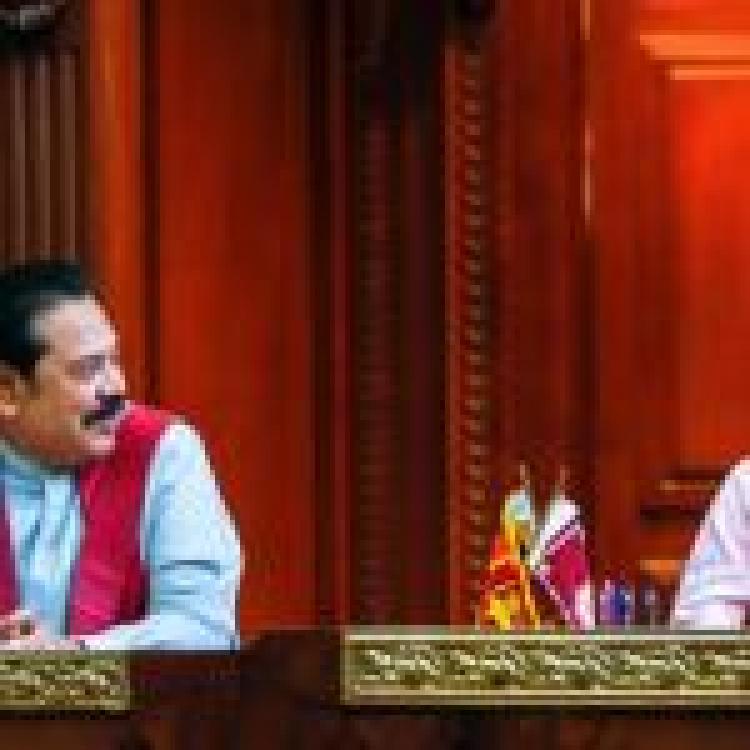Updated 11/11/18 09:06 GMT
Sri Lanka's president Maithripala Sirisena on Friday issued a gazette notification dissolving parliament and sacking all 225 lawmakers.
The gazette notification, released this evening, states elections will be held on January 5, 2019, almost two years ahead of schedule.
Unconfirmed reports suggest however the country's election commissioner has rejected the prospect of a new election, stating it would have be decided by the Supreme Court.
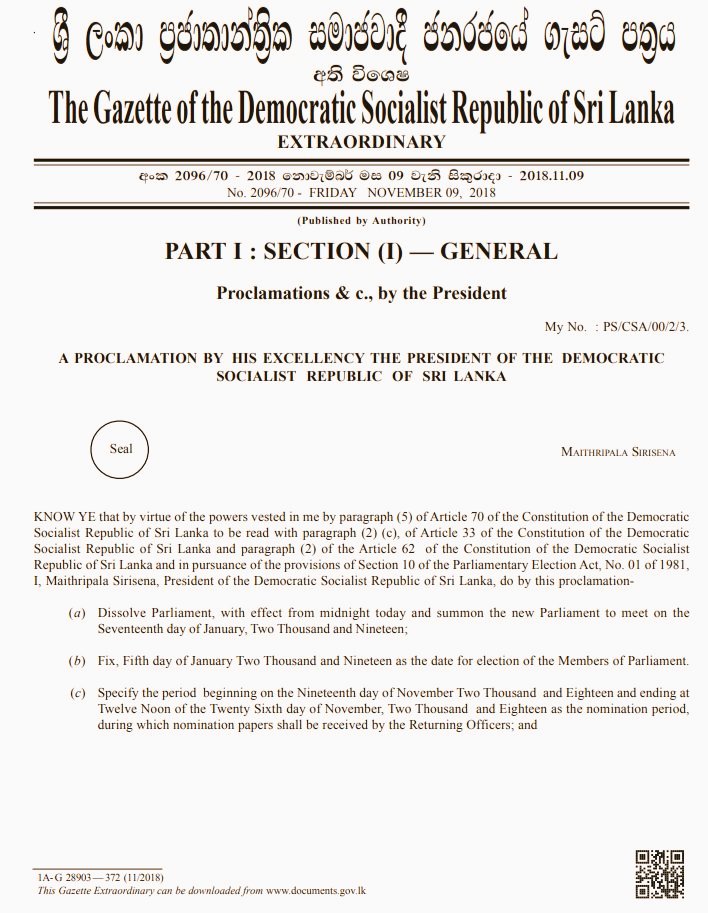
Colombo responds
Responding to news of parliament's dissolution, Mahinda Rajapaksa tweeted:
"As leaders, it is our responsibility and obligation to give the people the opportunity to voice their opinions on the future of [Sri Lanka]. A general election will truly establish the will of the people and make way for a stable country."
His brother, the former defence secretary, Gotabhaya Rajapaksa welcomed the prospect of elections.
"It is the people that decide on the fate of a nation. The genuine power of the people should deliver a stable and progressive future at this critical junction of our nation. I am confident that the people of Sri Lanka will make the right choice #lka #elections #Hope4SL," Gotabhaya tweeted.
The UNP condemned the move however, calling the dissolution "illegal".
"We vehemently reject the President's dissolution of Parliament. He has robbed the people of their rights and the Democracy that we have enjoyed. This dissolution by the President is illegal and goes against the constitution. We will be fighting this to ensure that Democracy reigns supreme in the country," the party's official twitter account posted this evening.
Responding to rumours of Sirisena's move earlier today, the JVP expressed its opposition.
“It is dangerous if someone goes for an election after obtaining power through unconstitutional means. If an election was announced under this unconstitutional government, it will be clearly construed as a part of this political coup," the JVP General Secretary Tilvin Silva said.
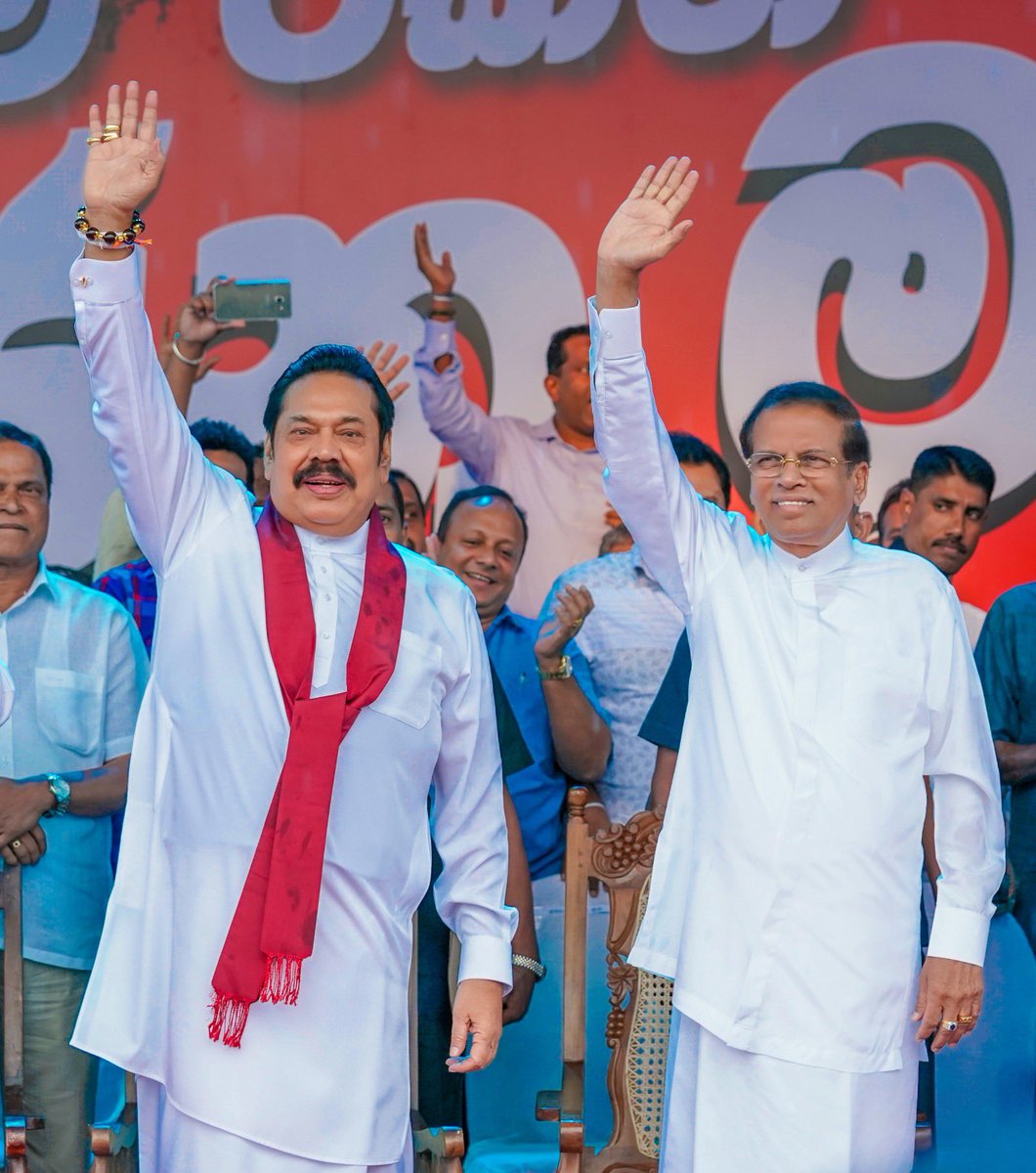
Tamil Nadu warns Tamils in jeopardy during Sri Lanka's turmoil
Political parties in Tamil Nadu condemned the dissolving of Sri Lanka's parliament, describing it as a "political emergency that threatened stability and jeopardised the welfare of Tamils", PTI reports.
The DMK leader M K Stalin said the dissolution of parliament was “trampling of the Constitution”, “atrocious” and the "murder of democracy".
Pattali Makkal Katchi (PMK) leader Anbumani Ramadoss warned the welfare of the Tamil population of the island nation was at stake.
T T V Dhinakaran of Amma Makkal Munnetra Kazhagam called on the United Nations and India's Central Government to ensure Tamils were not affected in any way.
Marumalarchi Dravida Munnetra Kazhagam (MDMK) general secretary Vaiko said Sirisena had played out a “treacherous drama”.
International concern
The UN Secretary General expressed concern over Sri Lanka's ongoing political crisis, calling on he government to ensure the safety of all Sri Lankans and to uphold its commitments to human rights, justice and reconciliation.
"Statement attributable to the Spokesman for the Secretary-General on developments in Sri Lanka The Secretary-General learned with concern of President Maithripala Sirisena's decision to dissolve Sri Lanka's parliament and move to new parliamentary elections on 5 January 2019.
The Secretary-General underlines the utmost importance of respecting democratic processes and institutions and resolving differences in accordance with the rule of law and due process. He renews his call on the Government to ensure peace and safety for all Sri Lankans and uphold its commitments to human rights, justice and reconciliation."
The United States, UK, Ausralia and Canada were swift to express their concern at the Sri Lankan president's decision to dissolve parliament, warning that the move would undermine the country's international reputation.
The US State Department's South and Central Asia desk tweeted:
"The US is deeply concerned by news the Sri Lanka Parliament will be dissolved, further deepening the political crisis. As a committed partner of #SriLanka, we believe democratic institutions and processes need to be respected to ensure stability and prosperity."
The US embassy in Sri Lanka warned there was much at stake and the latest move would serve to jeopardize Sri Lanka's economic progress and international reputation.
"President Sirisena's decision to dissolve Parliament poses a vital threat to Sri Lanka's democratic institutions. There is much at stake and such actions jeopardize Sri Lanka's economic progress and international reputation," the embassy said in a statement today.
"We call on the President to respect his country's democratic tradition and the rule of law, and to fulfill the commitments to good governance and democracy upon which he and his government were elected."
The newly appointed US ambassador to Sri Lanka, Alaina Teplitz tweeted:
"Democracies rest on rule of law. Sri Lanka’s constitution provides the framework for resolving political disputes, just like ours does."
In a joint letter to President Sirisena, US House Foreign Committee member, Elliot Engel, the co-chair of the Congressional Caucus on Sri Lanka and the House Democracy Partnership member, David Price warned the decision "could have an impact on the MCC program, US foreign assistance, and other US engagement and programs."
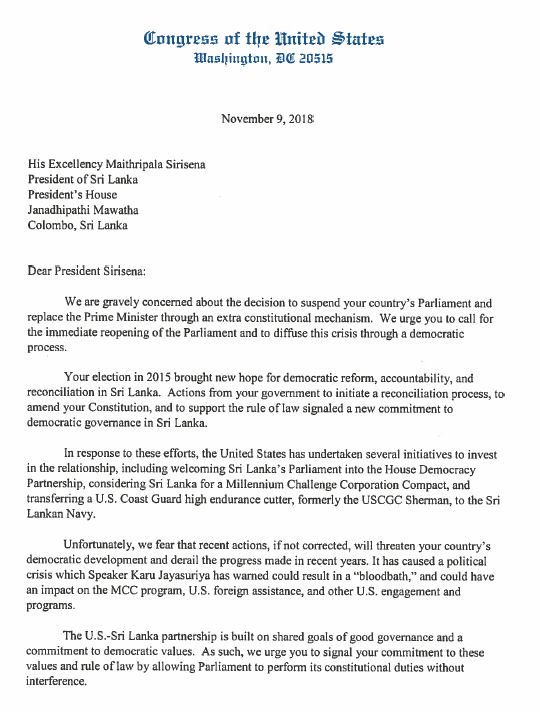
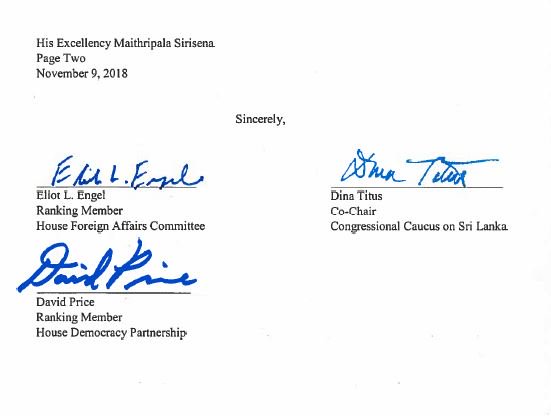
The UK's minister of state for Asia and the Pacific, Mark Field tweeted:
"Concerned by news that #SriLanka’s Parliament has been dissolved days before it was due to be reconvened. As a friend of Sri Lanka, the UK calls on all parties to uphold the constitution and respect democratic institutions and processes."
British High Commissioner to Sri Lanka, James Dauris tweeted:
"British Govt concerned that #SriLanka Parliament dissolved days before it was to be reconvened and calls for respect for democratic institutions and processes. Step taken ignores calls from around the world, including UN & Commonwealth, that it should be allowed to meet and vote."
The Canadian government said, "Canada is deeply concerned by the decision to dissolve Sri Lanka’s Parliament. This further political uncertainty is corrosive to Sri Lanka’s democratic future and its commitments on reconciliation and accountability," in a tweet.
Stating it was disappointed by Sirisena's decision, Australia's ministry of foreign affairs called on all parties to exercise restraint.
"Australia has expressed its concern and disappointment with President Sirisena’s decision to dissolve the Sri Lankan parliament on 9 November.
As a longstanding friend, we believe this action undermines Sri Lanka’s long democratic tradition and poses a risk to its stability and prosperity.
We urge respect for the country’s democratic institutions and for all parties to continue to exercise restraint."
The European Union's External Action spokesperson said it expected a "swift and peaceful" resolution to the crisis in line with the constitution.
"The decision of President Sirisena to dissolve the Sri Lankan Parliament ahead of its planned reconvening risks undermining public confidence in the country’s democratic institutions and processes and further deepens the political and economic crisis in the country. A fully functioning Parliament is an essential pillar of democracy.
As a longstanding supporter of a democratic Sri Lanka, the European Union expects a swift and peaceful resolution of the current crisis, in line with the Sri Lankan Constitution."
Norway's foreign minister, Eriksen Soreide said the country was "deeply concerned" by Sirisena's decision.
"Norway is deeply concerned by President Sirisena’s decision to dissolve the #SriLanka parliament days before it was due to be reconvened. Norway calls on all parties to respect democratic institutions & continue to exercise restraint- FM #EriksenSoreide"
Switzerland said it "deplores" the crisis and called on all parties to revert to the rule of law.
"Switzerland deplores the political crisis in Sri Lanka and the recent decision to dissolve Sri Lanka’s Parliament. It calls on all parties to follow democratic processes and to respect the rule of law.
Switzerland is deeply concerned by the increasing political crisis in Sri Lanka and the recent decision to dissolve Sri Lanka’s Parliament. Switzerland considers that this decision threatens the stability of Sri Lanka, may have adverse effects on its economic prosperity, its democratic future and the ongoing reconciliation process supported by Switzerland in the past years. Switzerland calls upon all parties to revert to the rule of law and to the principles of good governance. It requests all actors to exercise restraint and calls upon President Sirisena to settle the current crisis as quickly as possible while respecting the country’s democratic institutions and processes."
Wrangling for power
Sri Lanka plunged into political crisis last month after Sirisena sacked the prime minister, Ranil Wickremesinghe and appointed the former war crimes accused president, Mahinda Rajapaksa in his place, before proroguing parliament.
Today's events follow days of wrangling between the two main Sri Lankan parties, UPFA and UNP as to who commands a majority amid reports of bribes being offered to MPs to entice them to jump ship.
In his first statement since he was appointed as premier, Rajapaksa called for early elections.
“The primary objective of the political party leaders and parliamentarians who have joined me is to immediately hold the Provincial Councils elections that had been postponed continuously, and also to call a Parliamentary election as soon as possible so as to give the people the opportunity to vote for a program that will bring the country out of the all-encompassing economic, political and social crisis that it is now in."
Despite international calls for parliament to reconvene Sirisena has remained defiant, telling a rally of over 120,000 supporters this week that he would not bow to international pressure.
"Even if there are threats, pressure and forces, I will only move forward and will not take a step back," Sirisena vowed.
“I ousted a vision that is incompatible with our local culture and values, and that works according to foreign agendas."
"For the past 3 ½ years, poor people were suppressed by Ranil Wickremesinghe's economic and political vision. Local thoughts were rejected and an extreme neo-liberal form of governance was carried out."


